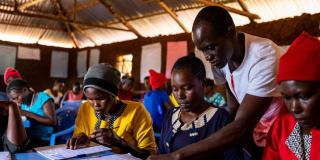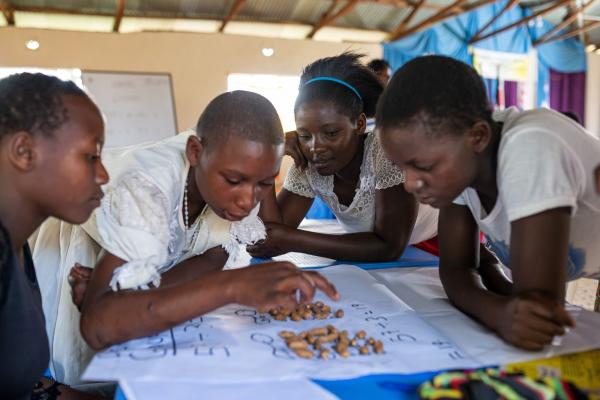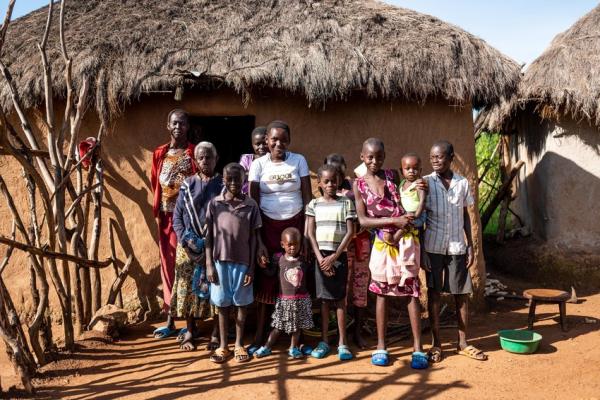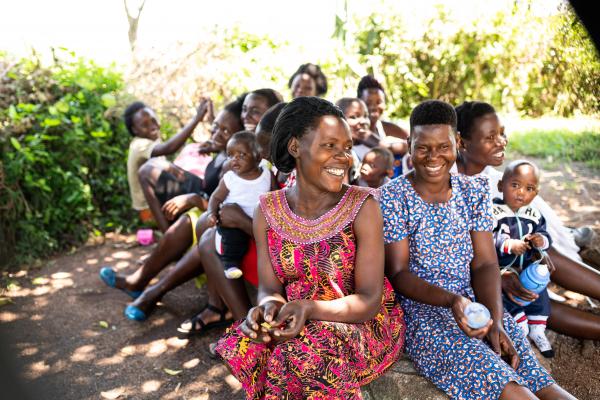
In Kenya, stories of young girls being ripped from their education and married off to men they don't know and who are twice their age, are far too common.
Girls taken out of school for marriage rarely go back to finish their education, and many become pregnant soon after – further limiting their freedom and independence. Many are even forced to 'prepare' for marriage by enduring painful and traumatic female genital mutilation (FGM) .
For families living in extreme poverty, marriage seem like the only option. 'Bride price' is prevalent throughout Kenya and can reinforce the perception of women as commodities, rather than active, independent members of society able to choose and forge their own futures.
What we do
VSO’s Education for Life project supports girls in hard-to-reach areas that have been denied their education by running catch-up centres and working with local school to teach the girls the vital skills they need to be independent and successful in their own right.
Girls can attend the centres free of charge and learn maths, literacy, English, and Swahili with qualified teachers. They are also offered support with their physical and mental health by creating ‘safe’ spaces in the community where they can talk about issues affecting them without judgement.
The girls are matched with specially-trained mentors from their community who offers life skills, support and advice. Our mentors also work with local communities to promoting more favourable views towards girls’ education in the community with a focus on early marriage, pregnancy and female genital mutilation.
VSO supports the girls to achieve their goals by providing funding for each girl’s next step as well as ongoing guidance and support to see them through to success. They can choose return to mainstream school, open a small business, join a vocational training course or take an apprenticeship to learn a trade.
Hear from our students and mentors

Rosa - student
My name is Rosa and I am 17 years old. In my life before this project, I was not busy with anything. My life was looking after cattle and fetching water, then I would go back home with nothing else to do. I had not gone to school. My life was just like that.
Before I got married my parents did not have money to take me back to school, so since I wasn’t in school I was to stay at home and take care of the cattle. I was asked to get married because there was nothing else there for me. My life was really not good. I felt so bad for myself because I could not go to school.
This project has really helped me because now, I can read, I can write. I can even write simple messages whilst talking to friends over the phone.
I was asked to get married because there was nothing else there for me
What really made me determined to go to school, was seeing others go. I always wanted to go just like them.
The main challenges in going were taking care of the cattle and fetching water, but I’ve overcome that obstacle by finding someone to do that for me before I go back home.
My dream now is to be a mechanic. Education has offered so many benefits to me because now, I can read, I can write, I can use the phone for messages and I can help my children to go to school, so that it will benefit them in the future."

Agnes - mentor
"My name is Agnes and my role is mentoring young girls with VSO.
The situation with girls not going to school is serious. Some of the girls are coming from distant places to go to school. Another reason is because of the school fees. When they go to school, they are asked for a small amount of money and the parents cannot raise it because of poverty. The other reason is because of the culture here. They don’t trust that education is better for their child so they want to keep their children at home.
We persuade the child's family by advising them that education is the future of this child. The past is gone now, we’re looking for a better future which is through education. That will benefit the child as well as the parents. So we do advise them and influence them.
There is difficulty for the girls going to school because now the child has another child. It is difficult at home as nobody can mind or stay with the child when the young mother is going to school. Also, they think that as they are young mothers, they cannot go to school.
When I see these girls who have gotten out of poverty, I feel like I have done my part
The difficulties I experience as a mentor is that the parents see that child as the world. They cannot accept the girl going to school unless you take your time talking to them and convincing them. They see you as taking their world away by not being with them, so they refuse. We do our best to convince them to let that young mother go to school for the better of her life.
We mentor the girls after the lessons that the teacher has taught them, or before depending on the time we have arranged. I mentor the girls by providing them with life skills like, how they can lead for themselves in their lives and how they can make effective decision making in their life.
The education has really changed their lives as some of them, the ones who could not write their names down, they now can! They can use phones to send messages, call people, find someone's number they want to call. They now know how to do this for themselves. They now know how to do self-grooming which they did not know, because they are not being taught all of that.
When I see these girls who have gotten out of poverty, I feel like I have done my part. I also feel like VSO has done their part to assist these girls from one step to another, so you do feel nice."

Suzanne - student
"My name is Suzanne* and I am 16 years old. Before the project my life was not good at all because I was always staying home doing nothing.
I was married but my husband was not taking care of me so I had to go back home. I have one child.
Seeing others going to school I used to feel very bad. Not being able to afford school really weighed down on me. I felt really bad seeing my peers go l when I could not afford it, not even having parents to take me back to school, it really made me feel so so bad.
I can benefit my child by helping my child know how to read and how to write and also to continue with their education
This project had really turned my life around as now, I can read, I can write, it really feels good! What really made me so determined to come to the catch up centre, was my aunt who takes care of me. She really motivated me to go back to school.
My dream now that I know how to read and write is to embark on a course that will help me take care of myself, my child and my community.
Education is really important to me. Now that I know I can read and write, I can benefit my child by helping my child know how to read and write and also to continue with their education."
*Name has been changed.
Read more

The year 2024 in photos and the stories behind them
Here we share some of VSO’s iconic imagery over the past year that capture the resilience and determination of the communities and volunteers we support. It’s also an opportunity to pay tribute to some of the people behind the lens who have helped bring their stories to light.
'Here's to every volunteer' - an inspiring song from volunteer and artist Larry Dwayne
Known in the music industry as Larry Dwayne, Lawrence Ochieng is a Kenyan volunteer, hip-hop artist, and activist who uses his platform to raise awareness about climate change. Listen to his original song, 'Volunteer'.
Meet the 2024 Volunteer Impact Award winners
Our annual Volunteer Impact Awards celebrates the incredible impact made by VSO volunteers across the world. Learn more about our four 2024 winners.
